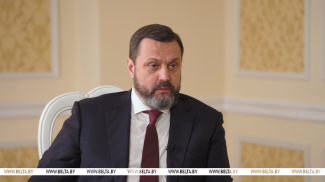MINSK, 14 June (BelTA) – Belarus calls on the participants of the 7th session of the Meeting of the Parties to the Espoo Convention to avoid discriminatory and biased decisions, Belarus First Deputy Natural Resources and Environment Minister Iya Malkina said when speaking on the second day of the 7th session of the Meeting of the Parties to the Espoo Convention in Minsk, BelTA learned.
Today the participants started considering the draft decisions of the Meeting of the Parties to the Espoo Convention, including the Belarusian case.
“The Convention was conceived as a tool for interstate dialogue to prevent, reduce and control the possible significant adverse effects on the environment as a result of economic activity. Belarus made sure that not only Lithuanian, but also Austrian, Latvian, Polish, and Ukrainian experts were involved in assessing the impact of the Belarusian nuclear power plant on the surrounding environment. Then Belarus invited these countries to participate in the post-project analysis. To enhance trust and alleviate the concerns that might arise at the stage of environmental impact assessment, Belarus invited Lithuania to set up a joint body for post-project analysis,” Iya Malkina said. She stressed that in order to ensure the viability of the Convention and to keep trust in it, it is critical to avoid taking discriminatory and biased decisions.
Iya Malkina recalled that Belarus reaffirmed its willingness to use all available means to ensure the highest possible level of nuclear safety, including the existing mechanisms of international peer reviews, primarily those of the IAEA. Belarus has hosted two key IAEA assessment missions: the Integrated Regulatory Review Service (IRRS) mission and the Site and External Events Design (SEED) mission. “We officially invited an Emergency Preparedness Review (EPREV) mission, which is scheduled for mid-March 2018, and a Pre-Operational Safety Review Team (Pre-OSART) ,” she said.
With regard to the draft decision submitted for the 7th session of the Meeting of the Parties to the Espoo Convention on the Belarusian case, Mr. Felix Zaharia,
Chair of the Espoo Convention Implementation Committee, made a brief presentation and voiced the proposals of the committee on the Belarusian issue.
Iya Malkina thanked the Implementation Committee, the Bureau and the Secretariat for the great preliminary work on the draft decision on the compliance with the Convention, and invited to discuss her own version. “The meeting is held to finalize, together with all stakeholders, the draft decisions prepared and submitted by the Committee. All new proposals to the agreed text submitted by delegations or large groups should have an equal status and should be discussed here in the context of an inclusive dialogue, as they do it in the United Nations. With regard to the issues related to nuclear power, it would be advisable to contact the IAEA. In order to avoid conflicts of competence, it will make sense to request information about the norms and standards in nuclear power from their main source rather than contact other organization or individual experts,” she said.
The head of the Belarusian delegation stressed that any mechanisms that may be proposed by the Meeting with regards to one of the disputes must fully rely on the Convention; should not be exclusive to one case, including the Belarusian one; and shall automatically apply to all current and future cases.
On the second day, the participants of the 7th session of the Meeting of the Parties to the Espoo Convention also heard a report by the Secretariat on the use of the budget during the previous inter-sessional period. Relevant proposals were made by the financial institutions and major donors to the Convention.
The Convention on Environmental Impact Assessment in a Transboundary Context was adopted in Espoo, Finland on 25 February 1991 to come into force on 10 September 1997. It has been ratified by 45 countries. The Espoo Convention obliges the signatories to carry out an environmental impact assessment of certain activities at an early stage of planning. It also lays down general obligations of the parties to the Convention to notify and consult each other on all major projects under consideration if such projects are likely to adversely affect the environment beyond national borders.











